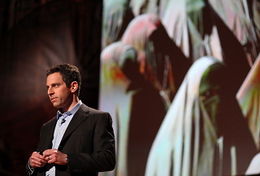Difference between revisions of "Stigma of atheism"
Conservative (Talk | contribs) (→Stigma of atheism in the United States) |
Conservative (Talk | contribs) (→Stigma of atheism in the United States) |
||
| Line 14: | Line 14: | ||
== Stigma of atheism in the United States == | == Stigma of atheism in the United States == | ||
| − | ''See also:'' [[Sociology of "atheism is un-American" view]] | + | ''See also:'' [[Sociology of "atheism is un-American" view]] and [[American atheism]] |
The abstract for the 2011 journal article ''An atheistic American is a contradiction in terms”: Religion, Civic Belonging and Collective Identity in the United States'' published in the ''European Journal of American Studies'' indicates: | The abstract for the 2011 journal article ''An atheistic American is a contradiction in terms”: Religion, Civic Belonging and Collective Identity in the United States'' published in the ''European Journal of American Studies'' indicates: | ||
Revision as of 17:50, February 22, 2019

Concerning the stigma of atheism, sociological research indicates that atheists are widely distrusted in both religious cultures and nonreligious cultures (see: Distrust of atheists and Views on atheists).[3][4][5][6] According to a study published in the International Journal for The Psychology of Religion: "anti-atheist prejudice is not confined either to dominantly religious countries or to religious individuals, but rather appears to be a robust judgment about atheists."[5] The study found that many atheists do not trust other atheists as well.[5]
The abstract for the 2016 journal article entitled Atheism and how it is perceived: Manipulation of, bias against and ways to reduce the bias which was published in the journal Nordic Psychology indicates: "...atheists are distrusted, elicit disgust and are viewed as immoral both explicitly and implicitly".[7]
Citing another study, which was published in the science journal Nature, on the public's perception of atheists the Smithsonian declares:
| “ | “It is striking that even atheists appear to hold the same intuitive anti-atheist bias,” study co-author Will Gervais, psychology professor at the University of Kentucky, tells AFP. “I suspect that this stems from the prevalence of deeply entrenched pro-religious norms. Even in places that are currently quite overtly secular, people still seem to intuitively hold on to the belief that religion is a moral safeguard.”[8] | ” |
The BBC declared in 2014: "A recent poll conducted by the Pew Research Centre shows Americans would rather have a president who was either in their 70s, or openly gay, or who had never held any public office than one that was atheist." (See: Atheism and politics).[9]
Furthermore, atheism is often associated with various types of immorality (see: Atheism and morality). In addition, historically atheists have frequently behaved in an immoral manner (see: Atheist population and immorality) and have committed various capital crimes (see: Atheism and Mass Murder and List of atheist shooters and serial killers).
Stigma of atheism in the United States
See also: Sociology of "atheism is un-American" view and American atheism
The abstract for the 2011 journal article An atheistic American is a contradiction in terms”: Religion, Civic Belonging and Collective Identity in the United States published in the European Journal of American Studies indicates:
| “ | Through the analysis of the status and perception of atheists in American history, from the colonial times to the beginning of the 21st century, this article explores the importance of religion in the structuring of Americans’ national and civic imaginaries. Starting from the assumption that atheists have always tended to be a distrusted minority in the United States, this essay seeks more precisely to explain how and why not to believe in God came to be regarded through the centuries not only as a moral and social deviance, but also as essentially “un-American” behavior. It further demonstrates that the historical “otherness” of the atheist tends to indicate that religion has functioned as one of the “moral boundaries” of a certain American “imagined community”, perceived as an essential warranty of both individual virtue and “good citizenship” and as a basic attribute of the American “self”.[10] | ” |
See also
- Atheism and social outcasts
- Closet atheist
- Atheism and loneliness
- Sociology of "atheism is un-American" view
Notes
- ↑ Roberts, Jessica, et al. (June 19, 2007). "Interview with an atheist". News21. Retrieved on July 30, 2014.
- ↑ NEWSWEEK Poll: 90% Believe in God, Newsweek 2007
- ↑ Study: Atheists distrusted as much as rapists
- ↑ Atheists Widely Distrusted, Even Among Themselves, UK Study Finds, Christian Post, 2015
- ↑ 5.0 5.1 5.2 Anti-atheist distrust ‘deeply and culturally ingrained’, study finds, The Independent, 2015
- ↑ Edgell, Gerteis & Hartmann 2006
- ↑ Atheism and how it is perceived: Manipulation of, bias against and ways to reduce the bias by Gerhard Andersson, Nordic Psychology 68(3):1-10 · January 2016, DOI: 10.1080/19012276.2015.1125304
- ↑ Survey Finds Most People Are Biased Against Atheists, Including Atheists By Jason Daley, AUGUST 9, 2017, smithsonian.com
- ↑ The stigma of being an atheist in the US By Aleem Maqbool, 2014, BBC
- ↑ An atheistic American is a contradiction in terms”: Religion, Civic Belonging and Collective Identity in the United States by Amandine Barb, European Journal of American Studies , Spring 2011